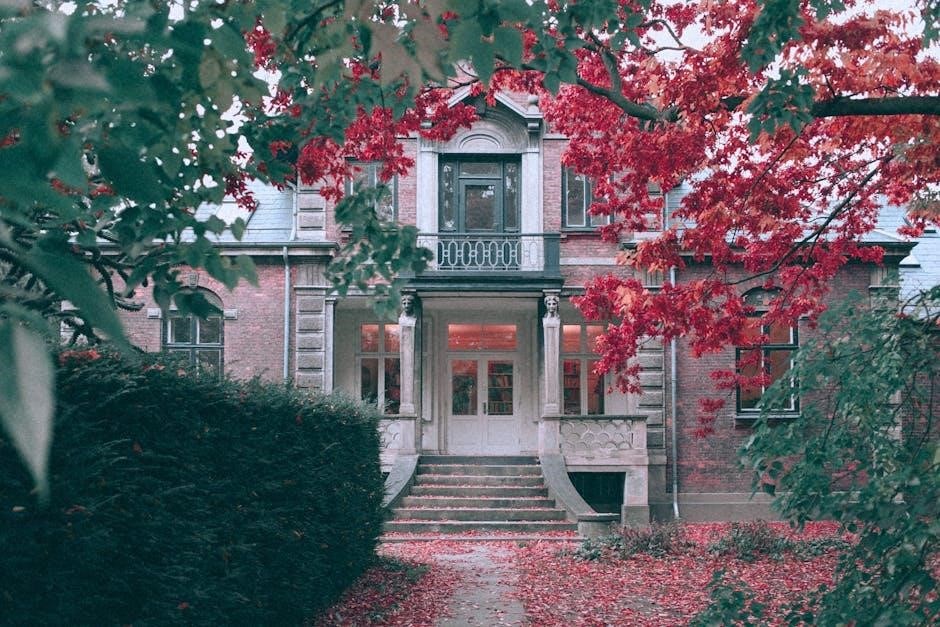Edgar Allan Poe’s “The Fall of the House of Usher” is a classic Gothic tale of mystery and horror‚ first published in 1839. The story explores themes of madness‚ family decline‚ and supernatural elements‚ captivating readers with its eerie atmosphere. Available in PDF format on platforms like LitRes and Project Gutenberg‚ it remains a cornerstone of Gothic literature‚ offering a haunting narrative that continues to inspire adaptations and analyses;
1.1 Overview of the Story
Set in a mysterious‚ decaying mansion‚ Edgar Allan Poe’s “The Fall of the House of Usher” follows an unnamed narrator visiting his childhood friend‚ Roderick Usher. Roderick‚ suffering from a mysterious illness‚ believes his family’s ancient house is alive and sentient. His twin sister‚ Madeline‚ falls ill and disappears‚ while Roderick’s mental state deteriorates. The story unfolds with eerie supernatural elements‚ culminating in the collapse of the house‚ mirroring the family’s tragic fate. Its haunting atmosphere and psychological depth define it as a Gothic masterpiece‚ widely available in PDF formats for readers worldwide.
1.2 Historical Context and Background
Written in 1839‚ “The Fall of the House of Usher” reflects the Gothic literary trends of the 19th century‚ emphasizing mystery‚ decay‚ and psychological complexity. Edgar Allan Poe crafted the story during a period of growing interest in supernatural themes and mental health‚ drawing inspiration from the era’s intellectual movements. The tale’s dark‚ atmospheric style resonated with readers‚ solidifying its place in Gothic literature. Today‚ the story remains widely accessible‚ including in PDF formats‚ allowing modern readers to explore its haunting narrative and enduring themes.

Plot Summary of “The Fall of the House of Usher”
The story begins with a narrator visiting his childhood friend‚ Roderick Usher‚ at his decaying mansion. Roderick‚ suffering from a mysterious illness‚ believes his house is alive and sentient. His sister‚ Madeline‚ disappears‚ and Roderick entombs her in the house. As the narrator stays‚ eerie events unfold‚ culminating in the house’s collapse‚ mirroring the Usher family’s tragic fate.
2.1 The Narrator’s Visit to the Usher Mansion
The narrator arrives at the Usher mansion‚ struck by its eerie and decaying appearance. Despite feelings of fear and awe‚ he is drawn to the house and reunites with his childhood friend‚ Roderick Usher. Roderick appears frail and mentally unstable‚ exhibiting strange behaviors and an obsession with the supernatural. The narrator agrees to stay‚ intrigued by Roderick’s enigmatic state and the haunting atmosphere of the mansion. This visit sets the stage for the unfolding mystery and horror within the Usher household.
2.2 The Mystery of Roderick Usher’s Illness
Roderick Usher’s illness is shrouded in mystery‚ marked by physical frailty and mental instability. He believes the house is alive and exerts a malevolent influence‚ contributing to his deteriorating health. His condition worsens‚ exhibiting erratic behavior and heightened sensitivity. The narrator observes Roderick’s decline‚ attributing it to psychological distress rather than physical ailment. Roderick’s mysterious affliction remains unexplained‚ leaving ambiguity as to whether it stems from supernatural forces or his own fractured psyche.
2.3 The Disappearance of Madeline Usher
Madelaine Usher’s disappearance adds a layer of mystery to the story. She is entombed in the house’s vault by her brother Roderick‚ who believes she has died of a mysterious illness. Her condition‚ described as catalepsy‚ leaves ambiguity about whether she is truly deceased. The eerie circumstances of her disappearance‚ along with Roderick’s superstitious beliefs‚ create an unsettling atmosphere. Madelaine’s fate becomes a central enigma‚ hinting at darker themes of premature burial and supernatural presence.
Themes and Symbolism in the Story
The story explores themes of madness‚ family decay‚ and isolation‚ while the house symbolizes the Usher family’s fate‚ reflecting their entwined physical and psychological deterioration.
3.1 The Theme of Madness and Mental Decay
In “The Fall of the House of Usher‚” madness and mental decay are central themes‚ deeply intertwined with the characters’ lives. Roderick Usher’s fragile mental state and mysterious illness mirror the crumbling house‚ symbolizing his deteriorating psyche. His obsession with strange books and fears of supernatural entities highlight his instability. The story masterfully portrays the blurred lines between reality and delusion‚ creating an eerie atmosphere that underscores the inevitability of mental and familial collapse. The PDF versions of the tale emphasize these elements‚ enhancing the Gothic experience for readers.
3.2 The Symbolism of the House of Usher
The House of Usher serves as a powerful symbol‚ representing the decay and eventual collapse of the Usher family. Its eerie‚ crumbling structure mirrors the mental and physical deterioration of Roderick and Madeline‚ while its isolation underscores their disconnection from the outside world. The house is often seen as a character in itself‚ embodying the dark history and cursed legacy of the family. Its collapse at the end symbolizes the irreversible downfall of the Usher lineage‚ leaving no trace of their existence. The PDF versions of the story highlight these symbolic elements‚ enhancing the eerie atmosphere and themes of decay and mortality.
Gothic Elements in “The Fall of the House of Usher”
The story features a decaying mansion‚ isolated setting‚ and dark‚ foreboding atmosphere‚ typical of Gothic literature. The PDF versions emphasize these eerie elements‚ enhancing the macabre experience.
4.1 Atmosphere and Setting
The story’s atmosphere is eerie and foreboding‚ enhanced by the isolated‚ decaying mansion. The house’s strange architecture and the surrounding landscape create a sense of dread. Available as a PDF‚ readers can immerse themselves in Poe’s Gothic masterpiece‚ experiencing the unsettling environment that mirrors the characters’ psychological states. The setting’s dark‚ haunting beauty is central to the tale’s horror‚ making it a classic in Gothic literature.
4.2 Supernatural and Macabre Elements
The story is rich in supernatural and macabre elements‚ such as the mysterious illness of Roderick and Madeline Usher‚ and the eerie presence of the house itself. The entombment of Madeline and her subsequent reappearance add to the horror. Available in PDF format‚ the tale’s unsettling atmosphere and dark themes captivate readers‚ making it a quintessential Gothic horror story. These elements contribute to the story’s enduring legacy in literature and popular culture.
The Significance of the House as a Character
The House of Usher symbolizes the decaying Usher family lineage‚ mirroring their psychological and physical deterioration. Its crumbling structure reflects their dark history and inevitable collapse.
5.1 The House as a Reflection of the Usher Family’s Decline
The House of Usher serves as a haunting metaphor for the family’s downward spiral. Its crumbling structure‚ with cracks and decaying walls‚ mirrors the mental and physical deterioration of Roderick and Madeline. The house’s eerie atmosphere and supernatural elements symbolize the family’s cursed legacy and inescapable fate. As the story progresses‚ the house’s decay accelerates‚ paralleling the characters’ psychological unraveling. Ultimately‚ the house’s collapse signifies the end of the Usher lineage‚ emphasizing the inextricable link between the family and their doomed residence.

Psychological Aspects of the Story
The story delves into Roderick Usher’s deteriorating mental state‚ marked by fear and a belief that his house is sentient. His entwined fate with Madeline underscores familial trauma and psychological decay.
6.1 Roderick Usher’s Psychological State
Roderick Usher’s psychological state is central to the story‚ depicting a man consumed by fear‚ paranoia‚ and a belief in the sentience of his house. His mental decline is marked by hypersensitivity and an unshakable sense of doom. The story suggests his psyche is intertwined with that of his sister Madeline‚ whose mysterious illness and disappearance exacerbate his instability. Roderick’s deteriorating mind reflects the decay of his family and the oppressive atmosphere of their ancestral home‚ blurring the lines between reality and delusion.
The Role of the Narrator
The narrator serves as both a participant and observer‚ providing an outsider’s perspective while being deeply entangled in Roderick Usher’s eerie world‚ adding ambiguity to the unfolding events.
7.1 The Narrator’s Perspective and Reliability
The narrator’s perspective in “The Fall of the House of Usher” is both intimate and detached‚ as he is a childhood friend of Roderick Usher. His emotional connection to Roderick adds depth but also raises questions about his objectivity. The narrator’s reliability is tested as he struggles to distinguish reality from the eerie‚ supernatural atmosphere of the mansion. His proximity to the events limits his ability to remain impartial‚ yet his rational demeanor makes him a credible observer of the unfolding horror‚ blending suspense with psychological insight.

The Ending and Its Ambiguity
The story concludes with the mysterious collapse of the Usher mansion‚ mirroring the family’s demise. This ambiguous ending leaves readers questioning the supernatural and psychological elements.
8.1 Interpretations of the House’s Collapse
The collapse of the House of Usher is widely interpreted as a symbolic reflection of the family’s moral and physical decay. Some view it as a manifestation of Roderick’s madness‚ where the house‚ like his mind‚ crumbles under unbearable psychological strain. Others see it as a supernatural consequence of buried secrets and ancestral curses. The ambiguity leaves room for interpretations‚ ranging from a literal physical collapse to a metaphorical end of the Usher lineage‚ emphasizing themes of guilt‚ shame‚ and the inevitability of downfall.

Cultural and Literary Impact
“The Fall of the House of Usher” has profoundly influenced Gothic literature and film‚ inspiring numerous adaptations and interpretations. Its haunting themes and atmospheric style continue to captivate audiences‚ making it a timeless classic in both literary and cinematic realms.
9.1 Influence on Gothic Literature and Film
Edgar Allan Poe’s “The Fall of the House of Usher” has left an indelible mark on Gothic literature and film. Its haunting atmosphere and themes of madness and decay have inspired countless adaptations‚ including films by Roger Corman and a 1928 silent movie. The story’s eerie setting and psychological depth have influenced writers and filmmakers‚ cementing its place as a cornerstone of the Gothic genre. Its enduring popularity ensures its influence continues to resonate in modern media and literature.
Availability and Downloads
The Fall of the House of Usher is available as a free PDF download on platforms like LitRes and Project Gutenberg‚ in ePub and other formats for easy access.
10.1 Where to Find “The Fall of the House of Usher” in PDF
The story is widely available in PDF format on platforms like LitRes and Project Gutenberg. Users can download it for free without registration. Additionally‚ websites such as ManyBooks and Google Books offer downloadable versions. Simply searching “The Fall of the House of Usher PDF” yields multiple trusted sources. Ensure to use verified sites to avoid unauthorized content. This accessibility makes Poe’s classic tale easily reachable for readers worldwide.
The Fall of the House of Usher remains a timeless Gothic masterpiece. Its themes of madness and decay continue to captivate readers‚ ensuring its enduring legacy.
11.1 Final Thoughts on the Story’s Legacy
“The Fall of the House of Usher” stands as a masterpiece of Gothic literature‚ its haunting themes and atmospheric brilliance continuing to captivate readers. The story’s exploration of madness‚ family decay‚ and the supernatural has left an indelible mark on literature and film. Widely available in PDF formats‚ it remains accessible to new generations‚ ensuring its enduring relevance. Poe’s work not only reflects the darker aspects of human nature but also solidifies his place as a pioneer of the Gothic genre‚ influencing countless adaptations and interpretations.